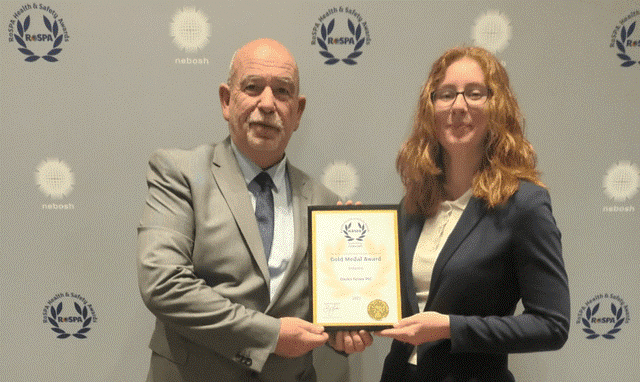In this, my first article of the New Year and as the new Chairman of the Association of Freight Software Suppliers, I would like to thank Ken Gower for his work as Chairman of AFSS during the last eight years. On behalf of all those that have worked with Ken and on behalf of the AFSS members I wish him all the very best in his retirement.
I’ve had the pleasure of working alongside Ken in my previous role, attending a number of industry meetings which he also attended on behalf of AFSS. His contri-bution to the industry was much valued and his professional approach when repre-senting AFSS was well received.
At the Association’s general meeting in November AFSS members joined Ken for lunch, where he was thanked for his work and presented with a gift as a token of ap-preciation.
The Association brings together and represents nearly 30 of the leading suppliers of software to the freight and transportation industry. AFSS represents its members on the main HMRC Joint Customs Consultative Committee (JCCC). It also plays an ac-tive role in various working groups keeping an eye on any developments affecting EU Customs procedures, and cargo security issues that may have an impact on software development.
Membership is open to any company providing software or related services to com-panies within the fields of freight, transportation, warehousing and international trade.
I take on the role as the third chairman of the AFSS. Brian Friday was the original holder when the Association was formed in 1993 and Ken Gower has been chairman of the AFSS for the past eight years.
Ken’s articles in the ITM over these years have covered many of the issues and challenges faced by the industry and software developers. In this article, I’ll attempt to outline what we expect to see in the forthcoming year and the impact this will have on the Software Suppliers and their customers over the next decade.
As we begin 2014 a number of things predicted during the last few years look to be happening at last. The industry now starts to face new challenges, some of which Ken has written about in his articles. Many in the industry had expected much of this work to have already been well underway by now or at best completed. However, as a result of delays to the introduction of new legislation in the EU and issues faced by HMRC in replacing CHIEF against their original timetable, we find that there is now an extensive combination of legal and technical changes that will be implemented in a relatively a short period of time.
In the UK the project to replace CHIEF, which was originally expected to have been well underway by now, has at last begun. In November HMRC began their procurement process with prospective companies who may wish to develop, in part or wholly, the new UK Customs Declaration System.
The replacement of CHIEF is likely to be a subject covered by both trade and national press. CHIEF has without doubt been a success and is without question a world leader. It has provided the UK with a first class Customs system. The exportation and importing of shipments using CHIEF has enabled movement of goods without unnecessary hindrance for 23 years. There is little doubt that the CHIEF system’s high availability, reliability and it’s multiple trade interfaces has paid an important part in helping UK companies remain competitive in the global market.
Clearly the team at HMRC understand the importance of their national system and the dependency we all have on this system in our daily life. The HMRC team involved in the replacement are all very experienced and have extensive operational knowledge of CHIEF and the role it has played in maintaining and managing the Customs procedures and processes in the UK. The ability for companies to move goods into and out of the UK without delay is also a key element for the future if UK business is to maintain its position as a major global trader.
One can only hope that the Treasury and Cabinet Office also understand the need for any replacement system to maintain the same high level of service and functionality. At this time there is intense scrutiny at the cost of providing IT solutions for the Government. We have all seen how much criticism there has been in the press for those Government managed projects following delays in implementing new technology, escalating costs and failures in delivering an adequate and workable solution.
The Treasury are duty bound to make sure that the UK Taxpayers money is well spent and that the best and most cost effective solution is found in replacing CHIEF.
Let us all hope that there is a comprehensive and clear understanding that in failing to secure an adequate replacement, the cost to UK Trade and economy may annually run into billions of pounds. The UK Government will need to invest heavily to ensure the replacement is adequate for current and future needs.
I am sure they understand the need to secure the millions of pounds of revenue collected annually. Failure to fund this project in full and secure an adequate replacement will be like throwing the ‘baby out with the bathwater’.
As well as providing the UK with a new Customs declaration system the replacement for CHIEF will need to cater for those changes required in the new European Customs Code.
Following the introduction of the Union Customs Code there will now be any number of changes to both Member States and trade IT systems in order to meet the new legislation. This process is due to extend until at least 2020 at which time the new Code must be in place. Whilst the basis of this new legislation is contained in the regulations; for software suppliers it is the Delegated Acts and Implementing Act and the subsequent technical specifications which are used to develop their products. The same will apply to those areas of CHIEF that may need to be changed to meet the new Customs Code. We understand that the process to set out the Empowering Acts will commence early in 2014 and should be adopted by early summer of 2015. The EU will also set out the IT programme from May 2014. The details of this and the Implementing Provisions then become the basis for the technical specifications. These will set out the extent of any changes to data elements and system. In some cases there may also be new interface specifications. Only once these details are known can a Software Supplier start their development.
The development also needs to be completed within the timescales set out in the EU Multi Annual Strategic Plan. Testing and Implementation are a key element in any system development and regrettably often the lack of adequate test platforms provided by both EU and National Administrations has resulted in delays and additional costs to both Government and Trade. In recent years faults on the national systems have not been identified until implementation due to inadequate testing facilities or inability to provide end to end testing. I understand that there is an acceptance in Brussels that all parties will need 24 months to develop new systems following publication of their specifications.
Another area of change which we expect to see impacting on the way International Trade operates is the requirement in many countries to provide shipment data in advance of loading. The legal responsibility to provide this information often falls on the carrier. With the extension of this requirement, initially in the US, now being placed on air carriers and courier operators. The need for the data to be passed in an efficient and timely manner will no doubt fall on the exporter and their software system. I believe, in future, carriers of all modes will require the data to be either sent to them or submitted to the various national administration systems well in advance of delivery.
Where there is bulk loading or consolidation of consignments involved, the need to ensure all the consignments are reported and given clearance to load will be essential. The industry will need to avoid a situation where shipments packed into one container are not prevented from being loaded due to one consignment failing to be given the permission to load. Although it is the Carrier in many countries who is legally responsible to meet the advance security reporting, it is ultimately the Forwarder, Shipper, Exporter or Importer that suffers the true cost when there are delays resulting from failures in providing adequate or timely data for advance reporting. In the US the trade have been working closely for a number of years to ensure that both the Carrier or the Forwarder are able to provide the data and both then have visibility of status in order to avoid costly delays.
With a combination of CHIEF replacement in the UK, a new Customs Code in the EU and increasing demands for advance data submission in many countries the Software Suppliers have their work cut out over at least the next ten years.
The challenge for Software Suppliers is not only to meet these requirements but to deliver the changes within the time limits.
Their software will need to remain user friendly and be adapted without the need for significant re training of their users. The combination of new tasks and the changes in technology has to be introduced within the traders systems in advance of any implementation date. The software also needs to have an ability to be flexible in the way upgrades are managed, if necessary switching back to a previous version. This is often an important element when interfacing with external systems and National Administrations software release. With many systems now mission critical, without this ability circumstances beyond the control of the Software Supplier may stop their customer operations.
With the AFSS membership now covering not only the UK but Ireland and Norway there is one common factor. They will all be starting to develop their systems to meet these changes, working with their customers and those National Administrations to which they connect. Their aim will be to provide the new functionality to meet these technical and legislative changes as they are introduced.
www.afss.org.uk





